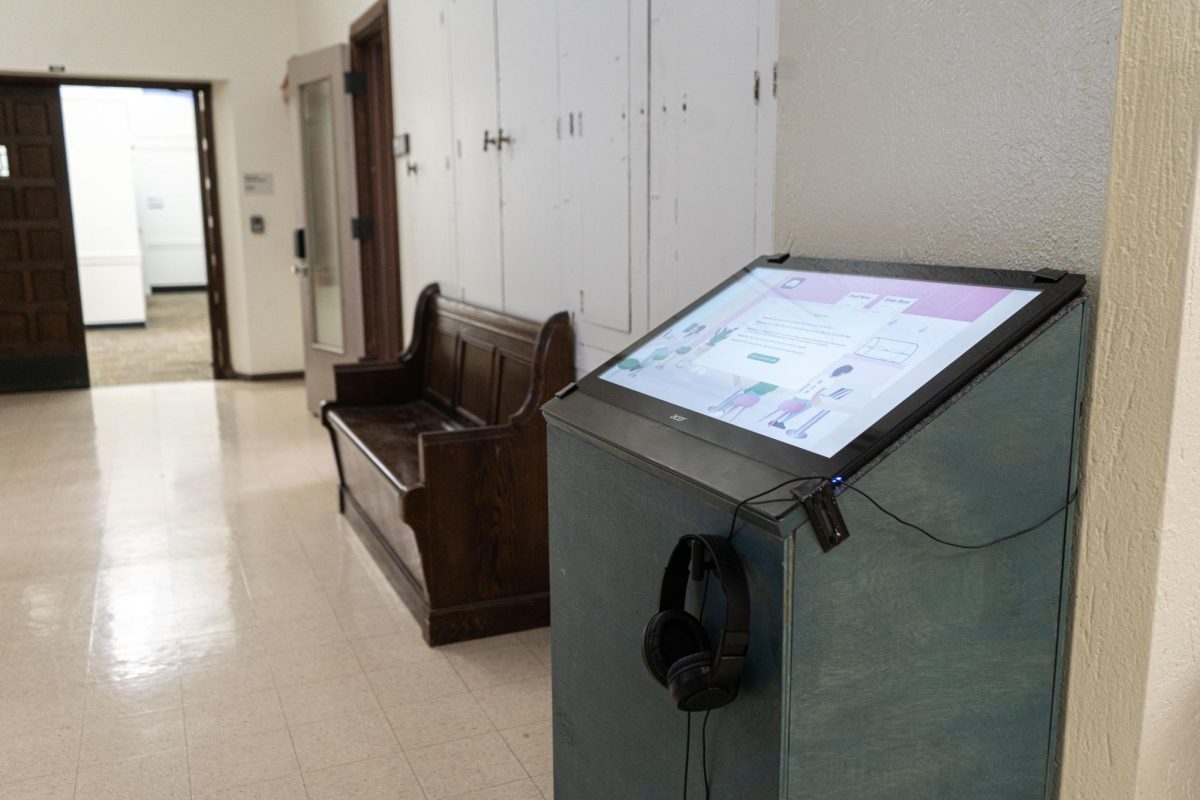Many Pitt students write a paper or take an exam as their class final, but students in ENGCMP 1130: Projects in Digital Composition created an interactive kiosk about a topic of their choosing.
Abigail Zimmerman, a junior digital narrative and interactive design major, enjoyed seeing something she worked so hard on displayed on the kiosk.
“I really loved going through the design process, seeing how things went and getting feedback on it and then doing everything all over again,” Zimmerman said. “That was really rewarding for me. And I just really loved having a full, final thing to show off to people.”
Students in the course, taught by Professor Stephen Quigley, created four projects throughout the course, and the kiosk, similar to touch screen displays in museums, served as a final culmination of their skills. Located on the fifth floor of the Cathedral of Learning, the English department displayed the kiosk from mid-January to Feb. 5, and students’ projects rotated weekly.
Quigley, a teaching associate professor in the English department, said he assigned the project so students can think critically about how to design for a certain medium — a kiosk — and learn about developing web content in general.
“Students have to think really carefully about the kind of constraints of designing for that environment,” Quigley said. “But on the alternative side, they’re thinking about all sorts of positives, like the fact that you can create videos, you can attract a user to your display.”
Saskia Van’t Hof, a junior digital narrative and interactive design major, appreciated how the class allowed students to incorporate their own ideas. Her project featured visuals of a colorful, bustling cafe designed to educate people about third places. She described the class as free-form, open and self-directed.
“You can tell just by looking at the list of projects that so many people had such creative, original ideas and they each related to their own personal passion,” Van’t Hof said. “On class showcase day, we went around and it was really astonishing because we all had the same exact very blank prompt and people came up with such different responses.”
Zimmerman feels the skills she learned through completing this project will benefit her in the real world and intends to include projects from this class in her professional portfolio. Zimmerman’s project focused on the topic of metamodernism.
“I think that just giving your students the freedom to fail, honestly, is really rewarding, and because you’re just graded on how much effort and care you put into it,” Zimmerman said. “I feel like that’s more realistic for the real world. Having to sort of do everything myself and see what happened was really, really gratifying.”
Quigley hopes that his students learn to compose media in multiple ways to reach a wider audience. He added that without skill, it’s difficult to reach the “largest number of audiences.”
“I’m thinking about how we can broaden our audiences by delivering content in a variety of different manners, what we call this as multimodal composing, to realize that our audience members are very used to getting their media at this point in multiple modes,” Quigley said.
Van’t Hof enjoyed the variety of mediums she got to try in the class.
“I really liked how we got to explore so many different mediums of digital composition,” Van’t Hof said. “I did everything from making a documentary to animation to making a portfolio and coding and illustration. We were just exposed to a lot of different things, which I liked.”
Zimmerman enjoys the digital narrative and interactive design major because classes like Projects in Digital Composition give her skills to find a job. She added that technology knowledge allows her to “convey her creative ideas.”
“I think while looking at jobs, showing that you’re capable of doing such a variety of things I think is really, really helpful,” Zimmerman said. “For me, I know that having both an English background and a coding background is really nice. All the skills you pick up sort of help you one way or another.”
Any student — regardless of prior coding experience — can take the class, according to Quigley. He said part of his research involves coding in the classroom.
“They don’t need anything at all,” Quigley said. “Every single class, I teach all of my students how to work with HTML just at a very basic level, to the degree that when they look at code, they’re not so scared of it anymore. It’s a form of literacy. And they know how to tinker with it and get it to do what they want.”
Van’t Hof appreciated the “workshop environment” of the class and enjoyed the time she spent working on her project.
“It really is a chance to pursue your own interests and create something that’s uniquely your own,” Van’t Hof said. “And the guidance of Dr. Quigley has also been nice. It was nice to share your project, be inspired by other students and create something that you can actually show. That was a really exciting part for me.”


